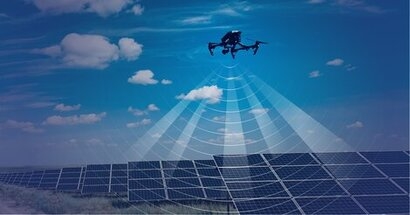
The project named 'Follow PV' will be funded by Innovate UK to develop cutting edge drone robotics for autonomous, fast, ultra-high-resolution solar plant inspections.
Solar PV capacity is increasing the fastest of all renewable energy sources, with countries racing to build large solar plants. Above uses drones fitted with specialist cameras and sensors to collect data about solar PV modules for asset managers and O&Ms. This solution is faster and more accurate than manual ground-based inspections using handheld equipment.
The company’s cloud-based platform, SolarGain, reveals defects within the PV module. Some defects are only visible very close up yet reveal early systemic degenerative problems. Current drone technology is not yet accurate enough to fly safely autonomously significantly closer above the solar panels, and so labour-intensive manual inspections are still often needed. The most important challenge the industry faces today is to reduce costs and increase efficiency, which the project aims to solve through its autonomous drones. Above aims to improve the efficiency of solar plants using autonomous drones, robotics, and artificial intelligence.
The project will unite experts in solar, robotics, artificial intelligence (AI), sensors and embedded systems to develop a spatially aware drone that can rapidly process and make in-flight corrections using artificial intelligence and sensing technology. This will enable the drone to better capture the condition of PV modules in greater detail by flying closer to the panels’ surface.
“It’s clear that robotics is playing an increasingly important role in the solar industry, and it’s exciting that Above is continuing to lead the agenda” said Will Hitchcock, CEO and Founder of Above.
Loughborough University (LU) and the University of Essex (UoE) have previous expertise in drone automation for 'smart agriculture'.
Matthew Coombes, Loughborough University’s Principal Investigator and a lecturer in autonomous vehicles in the Aeronautical and Automotive Engineering department, added that robotics and especially UAV’s have the ability to completely revolutionise how we conduct inspections and surveys across a number of sectors that traditionally rely on people painstakingly performing these manually. By performing inspections autonomously with UAV’s, they can be performed faster, safer, cheaper, and more accurately, while also being able to reach places normally inaccessible to humans. The solar industry would be an obvious benefactor from this technology.
For additional information:

